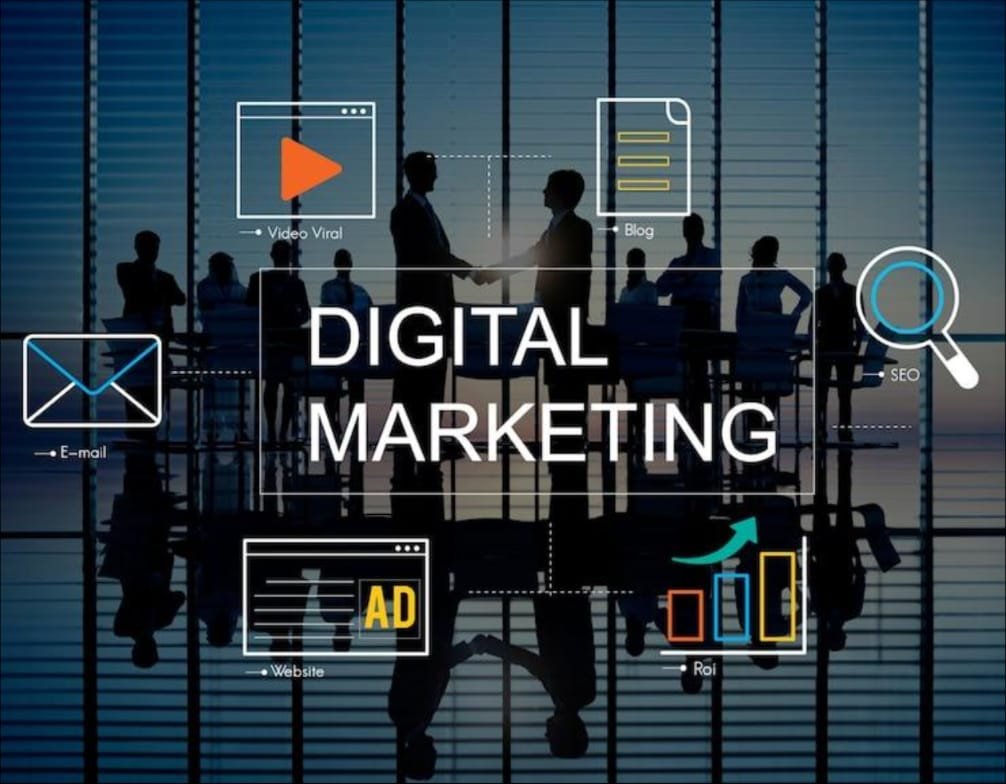In today’s world, everything is Online digital. From shopping , education ,study, we are all use the internet for almost everything. One areas that has grown very fast because to internet is marketing. This way of marketing is called digital marketing, and it has change how businesses talk to their customers. It also affect how people use when they are making decisions about buying something.
Secure your future by learning digital marketing from expert-designed marketing courses.

What is Digital Marketing?
Before we talk about behaviour. Digital marketing means promoting products and services using the internet and electronic devices.
These are important types:
- Social media (like Facebook, Instagram, Twitter)
- Email marketing
- Search engine marketing (Google Ads, SEO)
- Influencer marketing
- Online ads
- Websites and blogs
- YouTube videos
Digital marketing is faster, cheaper, and more targeted than traditional marketing like TV or newspaper ads and others ways .
What is Consumer Behaviour?

People behaviour is the study of how people decide what to buying, when to buy, and from where to buy. It also includes:
- Why people buying certain products
- How they feeling after buying
- How they compare products
- What influences their decision
Understanding consumer behaviour helps businesses make better products and services that people want to buy.
How Digital Marketing Affects Consumer Behaviour
Now let us understand how digital marketing affects the way consumers behave.
1. Easy Access to Information
One of the biggest changes digital marketing has brought is easy access to information. Today, if someone wants to buy a phone, they can:
- Read online reviews
- Compare prices on different websites
- Watch unboxing and review videos on YouTube
- Read blog posts about the product
This means that before buying, people are already well-informed. This affects how they make decisions. They don’t only depend on salespeople anymore. They trust what they read and watch online.
2. Social Media Influence
Social media platforms have a big impact on consumer behaviour. People follow influencers and brands on Instagram, YouTube, or TikTok. If an influencer recommends a product, many followers feel inspired to try it.
For example:
- A beauty blogger shows a new lipstick. Thousands of her followers may buy it the same day.
- A fitness YouTuber recommends a protein shake. His viewers might try it because they trust his opinion.
This type of marketing works because it feels more personal and real than a traditional ad.
3. Personalization
Digital marketing allows companies to send personalized messages. For example:
- If you searched for shoes online, you may see ads for shoes the next time you open Instagram.
- If you bought a phone, you might get emails suggesting accessories.
This makes customers feel that the brand understands them. It increases the chance they will buy something.
4. Online Reviews and Ratings

People trust other people’s opinions. That’s why online reviews on platforms like Amazon, Google, or Yelp affect how people buy products.
- If a product has 4.5 stars and many positive reviews, customers feel confident.
- If there are bad reviews, people may avoid that product.
So, companies now focus a lot on getting good online reviews because they know it affects buying behaviour.
5. Fast and Easy Shopping Experience
With digital marketing, customers can buy anything with just a few clicks. No need to go to a store, stand in line, or wait. Websites and apps are easy to use. This convenience changes consumer behaviour. Now, people prefer online shopping more than ever.
Also, companies send push notifications, emails, and SMS with offers and discounts. This encourages people to make quick buying decisions.
6. Price Comparison
Digital platforms allow people to compare prices instantly. If you like a dress on one website, you can quickly check the price on another. This makes consumers smarter and more price-conscious. They won’t buy until they are sure they’re getting the best deal.
7. Targeted Ads
Digital ads are not shown to everyone. They are targeted. For example:
- If you searched for a “budget laptop,” you’ll see ads for budget laptops.
- If you recently had a baby, you might start seeing baby product ads.
These ads are based on your search history, location, and interests, which are key considerations when allocating a SaaS marketing budget effectively. This kind of targeted advertising affects what you see and think about buying.
8. 24/7 Availability
Online platforms are open all the time. There’s no closing time. You can shop anytime—early morning, late night, or even during lunch break. This availability changes how people behave. They feel free to shop whenever they want, and this increases sales for businesses.
9. Loyalty Programs and Email Marketing
Many brands use loyalty programs, where customers get points or rewards for shopping. They also send special offers through emails to their loyal customers. These marketing tricks make people return to the same brand again and again.
10. Peer Pressure and Trends
In the digital world, trends spread fast. If a product becomes popular on social media, many people feel the pressure to buy it just to stay in trend. For example, a new sneaker or phone may go viral, and everyone suddenly wants it. This kind of marketing creates urgency and FOMO (Fear of Missing Out).
Positive Effects of Digital Marketing on Consumers
- More choices: Consumers can explore products from many brands, even international ones.
- Better prices: They can find discounts, offers, and compare prices easily.
- Knowledgeable decisions: They can read reviews, blogs, and watch videos before buying.
- Comfort and convenience: They can shop from home, anytime.
Negative Effects of Digital Marketing on Consumers
- Overbuying: Because of attractive ads and offers, people often buy things they don’t need.
- Privacy issues: Personal data is collected for targeted ads, which some people find uncomfortable.
- Fake reviews: Some reviews may be fake or paid, which can mislead consumers.
- Too many choices: Sometimes, too many options confuse people and make it harder to decide.
How Consumers Have Changed
Because of digital marketing, today’s consumers are:
- More informed
- More independent
- More demanding
- Less loyal (they switch brands easily if they find better deals)
So, businesses must work harder to keep their customers happy.
Take your digital marketing skills to the next level with Corvit system’s expert training.
